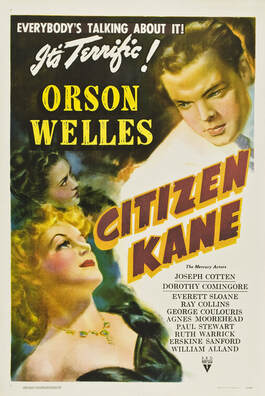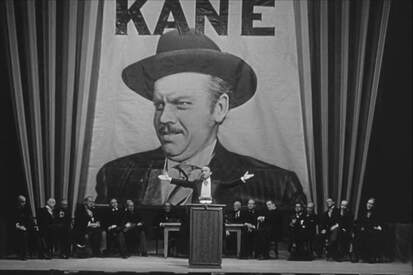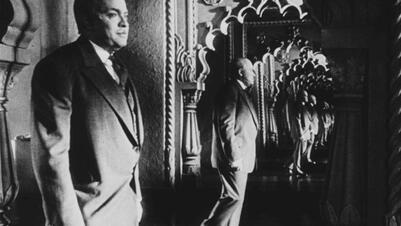
Please note: The following text contains spoilers. Viewer discretion is also advised – this film is rated ‘U’. For more details on the film’s content from a Christian perspective, read Movie Guide’s review: https://www.movieguide.org/reviews/citizen-kane.html
Mr. Bernstein: “There's a lot of statues in Europe you haven't bought yet.”
Charles Foster Kane: “You can't blame me. They've been making statues for some two thousand years, and I've only been collecting for five.”
As the first Faith & Film blog post of 2021, dear readers, I must begin as I mean to go on - telling the truth no matter the cost. So, I have a confession to make: Previous to writing this article, I had never seen the ‘cinematic landmark’ that is Citizen Kane. For years, I’ve carried this fact as a sort of low-level secret shame when interacting with fellow film buffs. It’s utterly ridiculous I know, since all it means is that I haven’t seen what is frequently touted as being the ‘greatest film of all time’. But when you put it like that, perhaps it’s indeed right to call into question my credibility as a film enthusiast – but that’s ultimately for you to decide in the comments below. However, such shame no longer has a hold over me, as I recently dedicated a wintery afternoon to immersing myself in the remarkable, if troubling excess of Kane’s mansion Xanadu, and the startling relevance of comments made regarding the importance of integrity in journalism, and the validity of always printing objective truth amongst the headlines. The star of the show, however, was of course Kane himself, played with steely determination by Orson Welles. Larger-than-life and ultimately a tragic character, Kane possesses a “longing”, “hungry soul” described in Psalm 107:9 (NKJV), which led me to reflect on the only One who can satisfy a person’s deepest longings: Jesus Christ.
So, whilst Citizen Kane begins as a sensational tale about the wonders available to those with untold riches and seemingly limitless fame, it gradually becomes a cautionary tale to those who so idolise living a life of excess - one that responsibly communicates its dangers rather than luxuriate in its many pleasures, unlike other films of the same ilk. For instance, the eponymous Kane inherits a gold mine at the age of 25, immediately making him one of the richest men in the world. He subsequently uses his fortune to take possession of the New York Enquirer, mount a political career, purchase countless antiques and artifacts, but also control those around him to satisfy his own desires. It’s in the film’s final third that Kane’s older self begins to closely resemble the later years of King Solomon, and specifically his writings within Ecclesiastes. In Ecclesiastes 2:10 (ICB), Solomon reflects upon his exploits thusly: “Anything I saw and wanted, I got for myself. I did not miss any pleasure I desired. I was pleased with everything I did. And this pleasure was the reward for all my hard work.” Kane did all of this and more, but later experiences bitter dissatisfaction just as Solomon did: “But then I looked at what I had done. I thought about all the hard work. Suddenly I realized it was just a waste of time, like chasing the wind! There is nothing to gain from anything we do here on earth.” (Ecclesiastes 2:11, ICB). When Kane experiences a great many losses, he retreats to his kingdom-like residence of Xanadu, a vast estate in Florida, with but himself and the servants for company. He has everything, and yet he has nothing – no friends, family or colleagues to enjoy his vast fortune with. Instead, he secretly longs to return to a life of simplicity and meagreness, visualised in a flashback to his childhood in which all that he owned was a snow sled, but was joyful regardless of his circumstances.
I felt and understood Kane’s crushing loneliness – to some extent, at least. Whilst I have never and will never be able to boast about owning a newspaper, or gold mine, I too have owned possessions which made me feel as if I didn’t need anything else, that everything I ever needed and wanted surrounded me already – whether it be romantic relationships, financial security etc. And yet, there came a time in which I realised that the great value I placed upon people and possessions in my life, was in fact misguided. Deep down, I was ignoring the fact that I still yearned for something more – I wasn’t complete! But whilst Kane desired a return to the simpler, innocent, yet completely unobtainable time in his childhood, I was unknowingly searching and longing for a connection to my creator. Thankfully, a friend pointed me towards God as being the One alone who could give to me all that I needed – salvation and a relationship with Him. So, I reached out to God in prayer, asked for forgiveness from my mistakes and to be given a friendship with Jesus. And it was only then, that I was given an overwhelming sense of peace and fulfilment in my heart which I had tried to gain for myself, for so long. I not only knew that I was forgiven, but that I now had everything I needed: forgiveness, salvation and a relationship with my creator God. A gap or hole in my heart had now been filled, thanks to Jesus and His uniquely redemptive power.
Such a moment revealed to me that both myself and Kane were lied to. We never needed more ‘stuff’ or ‘things’ to be fulfilled. All we needed was a relationship with the One who made us, in order to be truly fulfilled and saved. For God has designed us in such a way, that we are inbuilt with a desire to find everything that we need in Him. And it is in Him alone that we find salvation from the grip of sin and darkness in our lives: “For by grace you have been saved through faith, and this is not your own doing; it is the gift of God — not the result of works, so that no one may boast.” (Ephesians 2:8-9, NRSV). It is in Him that we find an ever-present Father who cares for us: “The Lord is my rock, my fortress, and my Saviour; my God is my rock, in whom I find protection. He is my shield, the power that saves me, and my place of safety.” (Psalm 18:2, NLT). It is in close friendship with Him, that we quickly come to realise that what we really need is God – before all of the possessions, wealth, relationships… Etc.
For the Bible teaches plainly, noted by Jesus himself: “It is worth nothing for a person to have the whole world, if he loses his soul.” (Mark 8:36, ICB). For whilst we can have anything and everything we want in this life, Kane’s end shows that a life like his is soulless, and we leave behind all that we accumulate on this earth when we die. But we need Jesus above all things, for He is the One alone who can give to us the gift of eternal life after we die on this earth. We cannot buy or gift it to ourselves so liberally, as Kane did with his art collection. No. For each and every one of us, the Bible teaches, has done wrong in God’s eyes and do not deserve to be forgiven: “The (just) payment for sin is death” (Romans 6:23, ICB). But the Good News is that we need not live an empty life and enter into a hellish existence after we die. For God has made a way for us to be rescued through Jesus Christ: “God did not send his Son into the world to judge the world guilty, but to save the world through him.” (John 3:17, ICB). Through Jesus’ death on the cross and subsequent resurrection, we have access to the gracious, undeserved gift of God which is forgiveness and salvation from our sins. It is only accessible through Jesus (Acts 4:12), but it is on offer to all today. And if we accept Him into our lives, we will have a palpable, ever-present sense of love, joy, hope and peace which comes from Him alone. Far better then, is it to accept Christ, than to accept the worldview and lifestyle of one Charles Foster Kane.
Challenge:
Why not prayerfully invite a friend or family member who doesn’t yet know Jesus, to watch Citizen Kane? Use the film’s themes to ask them what they thought of the film, if they spotted any links to Christianity and what they might think of the Gospel’s response to this subject.
If you feel able to, ask them what they think about the film’s view of amassing great wealth – is it good or bad? Healthy or unhealthy? Ask them what they think was the reason for Kane’s downfall. Why do they think he is unhappy and lost, towards the end of the film?
Do they believe that a person can be truly happy through having all the possessions they could want, or are other things more important?
Prompt them to consider Kane’s loneliness – everybody leaves him when he becomes obsessed with ‘things’ and treats those closest to him as such. Do they think it’s possible that he could find happiness elsewhere? Go on to discuss the lifesaving, life-changing gift of salvation, saying that God, through the sacrifice of Jesus, showed His love for us, to make a way so that nobody would have to live apart from Him in hell, for eternity. Instead, God wants us to be able to come to Him for what we need, so we might enter into relationship and eternity with Him. Take the opportunity to share the hope of the Gospel message with them – noting that God is the One we need over ‘things’, because He saves us from the grip of darkness now, but also in eternity too. Then, invite them (if you feel prompted to by God) to consider accepting Jesus into their life today.
Prior to watching the film for yourself, however, take a moment to pray that God would speak to you through the film. If you feel comfortable, pray this prayer over all of your future, film-watching experiences:
Dear Lord, as I watch this film, I ask that you would be present here with me. Highlight to me anything within it that is honourable, anything that can be used in conversation for your Kingdom purposes. Amen.
Citizen Kane is currently available to stream through BBC iPlayer (UK only).



 RSS Feed
RSS Feed